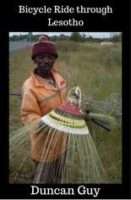They were having the party at Ntate Makhoabenyane’s place because he could offer them electricity to power their music system through an extension cord that ran across the yard, past the horse and into the main house.
The partygoers, who were all men dressed in blankets and gumboots, sat on the edge of the room, drinking beer. Every now and again they would get up to dance away to the music. The party went on as the afternoon turned to evening and the evening turned to a dark night.
A small candle glowed above the music system so that dancers could see what CDs they could play.
Meanwhile, in my rondawel I took a bath by candlelight.
Mrs Makhoabenyane had brought in a bucket of steaming hot water and a plastic tub with cold water. I couldn’t quite fit my huge self into the tub so I settled for a “bird bath”, trying unsuccessfully not to splash water on the carpet.
The loud music carried on into the night but I slept like a log in my rondawel!
In the morning I rubbed Deep Heat cream all over my tired muscles, wolfed down two energy bars and repacked my bicycle.
Ntate Makhoabenyane’s daughter passed by with a friend. She told me she was a trainee teacher.
“Well then, perhaps you can tell me why it is that so many young children I meet along the road can speak English while so many older people, even older young people, cannot?” I asked her.
“Free primary school education in Lesotho since 2000,” she answered.
Image: Duncan Guy, CC-BY-SA
WHAT DO YOU THINK? How do you think the lives of Lesotho’s children will be different to those of their elders who did not find it easy to go to school before 2000?


